The Canadian federal election of 2011 : can opposition get Harper on abuse of power instead of budget?
Mar 9th, 2011 | By Randall White | Category: In Brief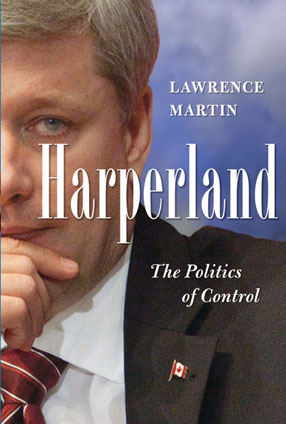
Lawrence Martin’s book on Stephen Harper, which came out late last year, argues that: “The forces of old grievances and narrow ideology pulled him in one direction. The forces of broader enlightenment pulled him in the other. The former won too many of the battles.”
[UPDATED MARCH 9, 8 PM ET]. Yesterday the two oldest Toronto newspapers threw a little red meat to those who long for the demise of the “Harper government” in Ottawa (with some milder parallel reporting in the rest of the country).
In the Globe and Mail Lawrence Martin’s column, “On the road to the Harper government’s tipping point,” presented a passionate recitation of the current Conservative minority regime’s assorted abuses of power – from (to take just a few cases in point) “in and out” financing in the 2006 election, to denying information to elected MPs on the Afghan detainees’ file, to using prorogation to evade democratic accountability to Parliament, to the more recent “document-altering scandal featuring International Co-operation Minister Bev Oda,” and to Immigration Minister Jason Kenney’s very recent improper use of his public office “to raise money for the Conservative Party,” etc, etc, etc (including “a dozen other examples of authoritarian measures more befitting a one-party state than a 21st-century democracy”).
Then the Toronto Star chimed in with an actual political news report headlined “Opposition looks to scandals, not budget, to bring down Tories.” (Which followed up, as it were on Monday’s “Liberals won’t rule out non-confidence motion against Harper government” in the Vancouver Sun and the Calgary Herald, along with yesterday’s “Usage illégal de ressources gouvernementales – Kenney s’excuse, mais rejette la faute sur son adjoint” in Le Devoir, and, stretching the abuse of power concept slightly, “Critics slam feds’ poverty plan Minister rejects 58 recommendations to help poor” in the Halifax Chronicle Herald.)
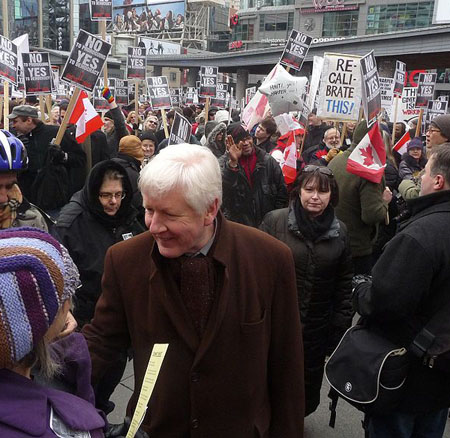
Liberal MP Bob Rae at public protest against minority PM Harper’s prorogation of federal Parliament, in Toronto, January 23, 2010.
As explained in the Star article, the practical political concept here is that: “Opposition parties in Ottawa want to bring the federal government down on a matter of confidence but not on the Conservatives’ terms … They are not so quietly devising a way to make political corruption and malfeasance the issue rather than risk using the March budget as the trigger, fearing that could backfire if it contains items that appeal to Canadians … While the minority Conservative government is expected to fight the next election on its track record on the economy, the Liberals and New Democrats told the Toronto Star they hope to use the so-called in-and-out election spending scandal and other missteps as the springboard to Election Day 2011.”
[CW Editors’ Note: Dr. White’s 8 PM ET update on this increasingly fast-moving story is at the bottom of the page.]
Some reasons for scepticism in the shorter term …
There are, a suitably cynical but wise enough observer might suggest, a number of reasons to be sceptical about the immediate future of such an opposition plot.
For one thing, the imminent federal budget is now only two weeks away. As explained by a related article that first appeared on the Globe and Mail website just after 9:30 ET Monday night:
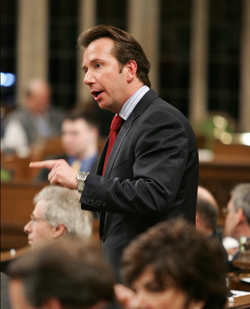
Liberal MP Scott Brison has asked the Speaker of the Canadian House of Commons, Peter Milliken, to find the government in contempt of Parliament, for refusing to fully disclose the cost of government crime bills.
“Any day, House of Commons Speaker Peter Milliken will issue rulings in response to two separate claims by Liberal MPs that the Conservatives are acting in contempt of Parliament. One, from Liberal MP John McKay, relates to accusations International Co-operation minister Bev Oda misled Parliament and had a document doctored. The other, from Liberal MP Scott Brison, asks the Speaker to find the government in contempt for refusing to fully disclose the cost of government crime bills … If either ruling sides with the Liberals, either MP could immediately move a motion of non-confidence in the government. While it is possible this could happen this week, it is more likely to come to a head after next week’s one-week Commons recess.”
As it happens, the week after next week’s one-week Commons recess starts on Monday, March 21, with the budget slated for Tuesday, March 22. A confidence vote on the budget won’t come right away: so a non-confidence vote on abuse-of-power issues could come later that same week. But wouldn’t that look pretty much the same as defeating the government on the budget? (Timing, as Pierre Trudeau liked to say he finally discovered, is everything in politics.)
Even supposing that the timing issue could be effectively managed and massaged, all three opposition parties would have to vote non-confidence in the government to bring it down. Could they all get their act together on some specific abuse-of-power narrative quite so quickly?
Even supposing that all three parties could agree on some specific abuse-of-power narrative quickly enough, would it finally prove effective enough to do serious damage to the Harper minority government in an election on May 2 or 9, say? Another story in today’s Toronto Star, eg (“Kenney faces new accusation of partisanship”) notes that: “An email sent Jan. 26 to at least one refugee rights organization directly attacks the policies of the Bloc Québécois. The email, obtained by La Presse, is signed ‘the Honourable Jason Kenney, Minister of Citizenship, Immigration and Multiculturalism.’” And : “Stephan Reichold, director of a refugee and immigrant umbrella group called TCRI, said he hasn’t seen such ‘partisan’ discourse from an immigration minister in ‘10 to 15 years.’”
Mmmm … not for 10 to 15 years? Well, that’s certainly not very nice, some will agree. But is it really a hanging offence in the real world of Canadian federal politics? (It implies, after all, that some Liberal immigration minister in the past has indulged in equally partisan discourse!)
Lawrence Martin wisely notes in his column today that, in judging the Harper minority government’s abuse-of-power track record: “It’s not the parts that count but the sum of the parts. Which invites the question: Is anyone doing the math?” He goes on to argue that: “During the Chrétien government years, I reported extensively on malfeasance by the Liberals. To do the math on the Harper government is to conclude that, while it has no sponsorship scandal on its books, it’s already surpassed its predecessor on a range of other abuse-of-power indices.”
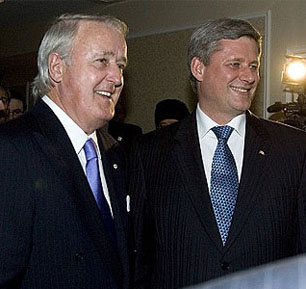
Brian Mulroney and Stephen Harper. Mr. Mulroney won two majority governments in 1984 and 1988. But his approval rating finally dipped to 11% in a 1992 Gallup poll. A year later he ended his career in Ottawa as “Lyin’ Brian ... one of the most unpopular prime ministers” in Canadian history.
As Mr. Martin implicitly recognizes himself, however, as yet only a few Canadian voters have really started to do the math on this front with the same degree of attention as Mr. Martin.
(Or a still not all that large contingent of others among us too, of course: among whom I would like to include myself. And I know all too well that most of the Canadian voters I live with day to day have better things to do than worry obsessively about federal politics.)
History suggests that it can take time for the abuse-of-power sins of governments in Canada to sink in, among an electorate preoccupied with the struggle to survive in our vast wilderness, etc, etc. (Consider, eg, the case of Brian Mulroney.)
Current opinion polls also suggest that many Canadians (nothing like a majority, of course, but …) still think well enough of Mr. Harper, more or less. Mr. Martin’s wisest paragraph in his column yesterday may well have been his last one: “The government’s arc of duplicity is remarkable to behold. And there are more revelations to come. It may not happen in the next election, but there will be a tipping point and the PM and his ministers will pay the price.”
Longer term optimism?
All this having been said, those who long for the demise of the “Harper government” in Ottawa probably can take some heart from the non-budget stirrings of the parliamentary opposition.
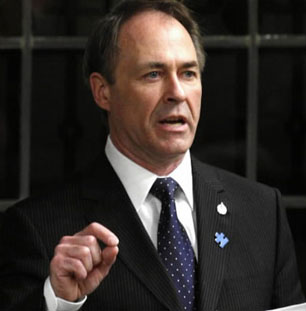
New Democrat MP Pat Martin, Winnipeg Centre: “We want to fight them on our playing field ... on their lack of ethics, scandals and political corruption.”
The Star’s “Opposition looks to scandals, not budget, to bring down Tories,” eg, brings a few welcome signs of actual co-operation between the Liberals and New Democrats. The “Liberals and New Democrats told the Toronto Star they hope to use the so-called in-and-out election spending scandal and other missteps as the springboard to Election Day 2011 … ‘We want to fight them on our playing field. Why not fight them on their lack of ethics, scandals and political corruption. We want home field advantage,” NDP MP Pat Martin told the Star Tuesday.”
By railing so much against “the coalition” as his only real opponent, Mr. Harper might be helping to bring about the kind of re-grouping on the traditionally dominant centre left of the Canadian political spectrum, that will ultimately put an end to his ongoing track record of “authoritarian measures more befitting a one-party state than a 21st-century democracy.”
Another welcome sign is the apparent collegial leadership of the opposition that wants to topple the Conservatives for anti-democratic abuse of power. “Opposition looks to scandals, not budget, to bring down Tories” mentions New Democrat MP Pat Martin, and Liberal MPs John McKay, Scott Brison, and Ralph Goodale. Another article in yesterday’s Globe and Mail reports: “Justin Trudeau takes Jason Kenney to task for alleged abuse of ministerial office.”
Late this past January, contemplating the prospect of yet another Canadian federal election in 2011, Gordon Gibson in BC was speculating about a new and more attractive Liberal message, whose first element was “the claim that this will be an election about the team, not the leaders.” At last, we seem to be seeing a little of this kind of team approach in action (among both Liberals and New Democrats?) And it is refreshing, as well as arguably more effective than some drag-out, knock-down battle between Harper and Ignatieff (or Harper and Layton, to say nothing of Layton and Ignatieff: and then of course there is the ultimate wild card of M. Duceppe – with the prospect in some polls of a seat or two for Ms. May’s Green Party at last too).
Finally, if there is something altogether appalling about Stephen Harper and his minority governments it is no doubt his underlying contempt for democracy and Canada’s democratic political culture – and not what has proven to be his practical approach to economic management (most of which has simply been shrewdly appropriated from the Liberals under Jean Chretien and Paul Martin). Someone whose party has won only a little more than a third of the cross-Canada popular vote should be showing at least a little more respect for the more than 60% of the Canadian people who have never voted for his leadership.
If it is in fact going to take still another election after this one for what Lawrence Martin calls the the Harper government’s tipping point on this front to finally crystallize, that’s all the more reason for the opposition “coalition” to start focusing on the full range of abuse-of-power indices now – and to start encouraging more and more voters to do the math.
Meanwhile, if later this month the government is finally brought down on a budget it could make sure the opposition majority in Parliament liked well enough, if it really wanted to (as it says again and again it does), that’s not exactly the worst thing that could happen either.

Liberal deputy leader and MP for Regina Wascana, Ralph Goodale, and his wife Pamela, at the Saskatchewan Science Centre's charity gala Fantasy Food 2009. Mr. Goodale still believes the government can be fought on its 2011 budget because of bad economic choices. But he also agrees that its “ethical transgressions” are reaching a “critical mass.”
The abuse-of-power argument can still be worked into the 2011 election narrative – perhaps in a way that will at least prevent a Harper majority government at last.
To quote the last two paragraph’s of yesterday’s Toronto Star article on the subject: “Liberal MP Ralph Goodale, the party’s deputy leader, said he still believes the government can be fought on the budget because of the government’s bad economic choices – fighter jets, jails and extra corporate tax cuts – but concedes the cumulative affect of the so-called scandals is an equally attractive option for taking Canadians to the polls … “There is growing evidence of their (the Conservative government’s) distinct lack of ethics and integrity,” Goodale said. “Things are reaching a critical mass . . . the ethical transgressions are accumulating.”
The plot thickens with Tuesday’s Liberal motion …
The absolute very last words on this subject, for the moment at any rate, probably belong to a column by Chantal Hébert that has just appeared on the Toronto Star website today (or, more exactly, this morning, shortly before 12:30 AM ET) :
“If the words of federal politicians have any meaning, the final act of the 40th Parliament is already underway.
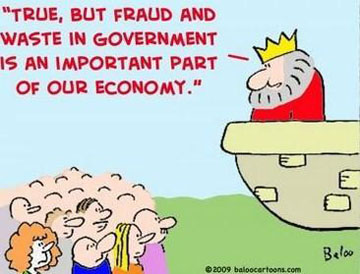 “On Tuesday the Liberals put forward a motion that could make it morally impossible for any opposition party to support the March 22 Conservative budget.
“On Tuesday the Liberals put forward a motion that could make it morally impossible for any opposition party to support the March 22 Conservative budget.
“The motion does not deal with the economy, the deficit or any of the issues that routinely attend a budget. If anything, one of its political objectives is to reduce the upcoming budget debate to a sideshow, by pushing the issue of Conservative ethics to centre stage.
“To achieve that, the motion focuses on the so-called ‘in-and-out’ electoral financing scheme used by the Conservatives in the 2006 election to maximize their campaign spending.
“On paper, it is an issue whose narrative thread may have been lost by many voters along the way. The battle between the ruling party and Elections Canada is already five years old. A few years ago, it featured an unprecedented police raid on Conservative headquarters. Now it is slowly unfolding before the courts. Recently, charges were laid against a handful of senior party officials, including two senators.
“But the motion serves a larger purpose. It is designed to start driving a stake through the heart of the minority Parliament ahead of the budget.
“The motion is not binding. It does not directly address the issue of the confidence of the House in the government. In theory, the fate of the minority Conservative government is not in the balance – or at least not immediately.
“But in this instance the procedural mechanics may be less important than the positioning of the three opposition parties.”
So … who knows? It may be that those who long for the demise of the “Harper government” in Ottawa actually have now begun to see some kind of beginning of the end (even if the Canadian federal election of 2011 does prove to be something that makes the end – and Prime Minister Stephen Harper – continue to last for some time yet)?
UPDATE MARCH 9, 8 PM ET: Today House Speaker Peter Milliken found the Harper government in contempt of Parliament on both the claim by Liberal MP John McKay, related to accusations International Co-operation minister Bev Oda misled Parliament and had a document doctored, and the claim by Liberal MP Scott Brison on the government’s refusal to fully disclose the cost of government crime and other bills. See, eg: “Conservatives rebuked as parties inch closer to election” and “Speaker hits Tories with two more contempt rulings.”
As the first of these two press reports explains: “All of this means that opposition parties could opt to defeat the government with a no-confidence motion on the topic of their choosing, rather than having to vote against a populist financial document designed to gain favour with voters in a federal campaign.”
The second report spells out some further procedural wrinkles: “Speaker Peter Milliken has found the Conservatives in contempt of Parliament, handing powerful ammunition to opposition claims the Harper government’s autocratic behaviour represents an abuse of power … The ruling is only ‘on its face,’ and a Commons committee will spend next week deciding what action to take.” At the same time, on Mr. Brison’s cost disclosure issues committee members are to “bring back their final recommendation to the House on Monday March 21, the day before the Conservatives bring down the budget.” And “the third week of March will be singularly tumultuous, and may well lead to the minority government’s fall – if not on the question of the budget, then on the question of contempt.”
It remains unclear, however, whether a non-confidence motion on the question of contempt, as opposed to the budget, will actually see the light of day. According to yet another report: “Liberal leader Michael Ignatieff was immediately faced with questions over whether he intends to put forward a non-confidence motion on March 21 to defeat the government before its budget and to spark an election … ‘We’re going to keep all our options open,’ he told reporters.” Mr. Ignatieff went on: “Whatever happens here … Canadians will be asked to make a judgment about whether these people are competent economic managers and they’ll also be asked the simple question, ‘Do you trust this prime minister with power?’ Seems to be obvious the Speaker of the House of Commons does not.” NDP House leader Libby Davies “said her party will participate in the hearings and hasn’t decided what to do if the Liberals put forward a non-confidence motion.” Bloc Quebecois leader Gilles Duceppe “was coy about whether he would, if necessary, join other parties in defeating the government over the latest development.”
Two further wrinkles are also somewhat interesting. First, on last night’s adventures, initially reported on by Ms. Hébert: “After debating the matter, the House voted 152-139 Tuesday night to pass a motion calling on Harper to cut his ties with the four Tories facing charges [in the in and out election finance scandal] … The vote was non-binding, however, as the Liberals chose not to make the motion a confidence vote that, if defeated, could trigger an election.”
Second, the prospect that minority PM Harper himself might now, in advance of the scheduled budget on March 22, go to the Governor General and request a fresh election (presumably on the grounds that it has become obvious his government no longer has the confidence of the House, even if no formal motion to this effect has yet been broached?) was also raised late today – perhaps only jocularly, by a Liberal Party of Canada guru who writes for the Globe and Mail.

I don’t like Harper’s agenda. If you google, Harper delivers plan for, Global governance for Canada, you will see why Harper is, the worst P.M. for our country.
A person hardly knows what party to vote for. It seems none of them, are for the welfare of the people. Harper with his Global governance. Jack Layton is supporting Harper’s plan to, give huge corporations another tax reduction. That reduction, comes off Canadians paychecks. Big business wins again, over the citizens. Ignatieff supports the HST, the tax that killed, the BC people and the Ontario citizens. All of the HST provinces, have fared very badly.
On the House of Commons TV channel, a motion was passed, by the entire House. They gave, banks, mines, huge corporations, gas and oil company’s, billions of our tax dollars. They get huge tax reductions, and now another reduction. These are the wealthiest outfits in the world. I have e-mailed many government officials to ask why? None have given me an answer. Our governments, thieve from the people, and give our money to these wealthy corporations. Which political party will stomp out this menace of corruption? I say, not one.